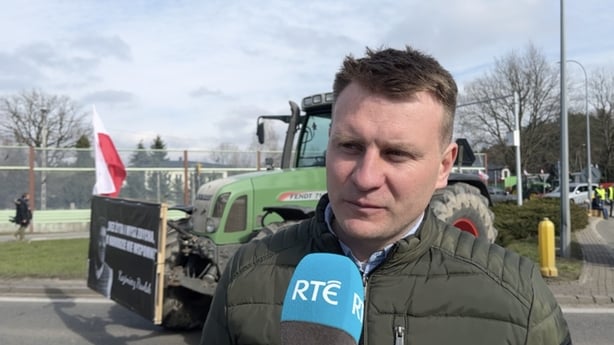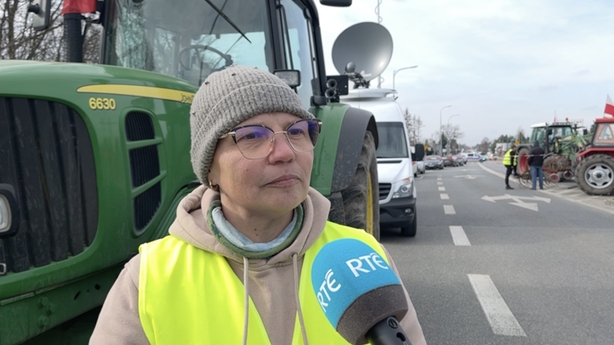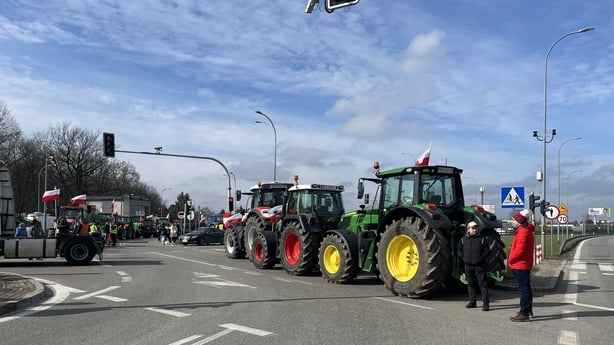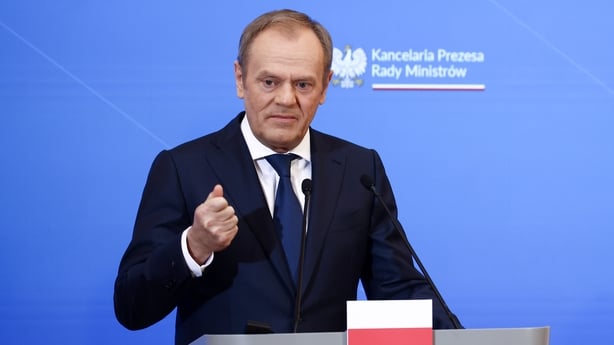On Wednesday morning, about 80 farmers parked their tractors at a motorway intersection outside the town of Legionowa, 30km north of Warsaw.
They had come to protest the European Union’s Green Deal, the bloc’s plan to achieve climate neutrality by 2050, and to oppose excise-free access for Ukrainian food imports to the EU.
Most of the protesting farmers came from the surrounding Pułtusk county area, a region of flat fields and towns with pretty market squares, dissected by the Narew river.
Farmers warmed themselves next to an open fire and ate ‘grochówka’, a hearty pea soup.
It was one of more than 550 blockades staged by Polish farmers across the country that day, causing widespread traffic disruption outside cities and large towns.
Polish farmers are not unique in their opposition to the Green Deal, which aims to curb farming practices, such as the use of pesticides, that can harm the environment.
Farmers groups in other EU countries have also protested against it in recent weeks. They say the changes are too costly and threaten their livelihoods.
For the past year Polish farmers have also opposed imports of tariff-free Ukrainian produce, particularly grain, to the EU’s single market.
“The prices of our products have fallen to a very low level. People are not willing to buy our produce because of the influence of goods from Ukraine,” Mateusz Zurawinski, a 33-year-old dairy farmer at the protest in Legionowo, told RTÉ News.
Mr Zurawinski owns a herd of 30 Friesian cows on his family’s 150-acre farm, where he also grows grain.

After Russia’s full-scale invasion, the EU granted Ukrainian food producers access to the bloc’s single market.
By April 2023, a large excess supply of grain, possibly 4 or 5 million tonnes, had built up in Polish warehouses, accounting for about 10% of annual Polish cereal production.
Polish farmers’ unions argued that cheaper Ukrainian imports had made their own domestic grain produce less competitive. However, global grain prices also declined throughout most of 2023.
Mr Zurawinski, who led the protest in Legionowo, also said that he also opposed the Green Deal’s “eco-schemes”, practices proposed by the European Commission to minimise any negative effects of agriculture on the environment.
Another protesting farmer, Agnieszka Wlodarska, also from Pułtusk county, said it was a difficult time for farmers.
“I have to work another job because otherwise we wouldn’t get by,” she said.
Ms Wlodarska and her husband are grain and fruit producers.
She opposes the Green Deal, she said, because her family would still be required to pay tax on land that must be left uncultivated.
Poland’s protesting farmers belong to a number of associations, with different political allegiances.
But the nationwide strikes are being led by the farmers branch of the Solidarity trade union, which is demanding compensation for low food prices and financial support for its members.
The country’s farming sector modernised quickly after accession to the EU in 2004. There are fewer farms in Poland today than there were 20 years, but they are now larger and generally more specialised.

Poland’s new pro-EU coalition government, which came to power in December, campaigned hard during last year’s general election to appeal to the demands of protesting Polish farmers, promising to solve the dispute over Ukrainian imports.
They won over some voters too after Michal Kolodziejczak, the 35-year-old founder of a left-wing agrarian movement, joined the ranks of the then-opposition. He is now the deputy agriculture minister.
However, Prime Minister Donald Tusk’s coalition has lost some of that momentum.
It has inherited the same demands from farmers which drove the previous nationalist Law and Justice government to enact protectionist policies against Ukrainian grain and other food imports.
Last month, Mr Tusk met leaders of farmers’ associations and said he would push for further restrictions on Ukrainian imports at EU level and ask for the suspension of some parts of the Green Deal.
The farmers’ protests have forced Mr Tusk, an economic liberal, to pursue protectionism.
But his promises have not satisfied all farmers and the protests have continued into this month, including a march in Warsaw on 6 March which resulted in confrontations with riot police and at least a dozen arrests.
Early on Wednesday this week, the same day as the planned mass blockades, Polish agriculture minister Czeslaw Siekierski, signed a deal with representatives of the main Polish farmers’ unions to reach a compromise.
Mr Siekierski told the unions he would discuss the possibility of suspending the transport of Ukrainian food imports via Poland with Mr Tusk.
If that concession is granted by the current government, and it is a big ask, then it would cut off a vital export route for Ukrainian grain to the rest of the world and deprive Kyiv of an important revenue source.
There is another more dangerous route, of course, the Black Sea, which is mostly controlled by Russia’s navy.
Mr Siekierski also committed to providing government subsidies to some Polish grain farmers.

Sonia Sobczyk-Grygiel, a senior economics analyst for Polityka Insight, told RTÉ News that, although most farmers are satisfied with the agreement, “they want to continue protests to put pressure” on the Polish government before it holds talks with Ukrainian officials in Warsaw next week.
Opposition parties, she said, were likely to take advantage of the protests before local elections on 7 April and European Parliament elections in early June.
The onset of those EU-wide elections has put farmers’ concerns front and centre for many political groups across the bloc.
At the centre-right European Peoples’ Party congress in Bucharest earlier this month, European Commission President Ursula von der Leyen told delegates that the EPP will “always be by the side of our farmers”.
After championing the Green Deal during her first term as Commission president, Ms von der Leyen’s nod to farmers underlined how seriously the EPP, of which Fine Gael is a member, is taking the protests in different member states.
Polling across the EU shows that the European Parliament main far-right bloc may increase its share of MEPs by between 28 to 40 seats, which would give it a almost 100 seats in parliament.
Similarly, Mr Tusk told reporters last month that “Polish farmers can count on me”.
His party, Civic Platform party, is also a member of the EPP, and wants to avoid becoming the object of an anti-establishment vote from farmers’ groups.
Ms Sobczyk-Grygiel said that groups linked to Russia and Belarus are trying to “influence agricultural sentiment” in Poland through social media.

On Wednesday, the EU granted an extension until June 2025 for Ukrainian food producers to benefit from tariff-free access for their goods entering the EU.
Politico reported during the week that Poland, supported by France, had wanted more wide-ranging restrictions on Ukrainian imports.
But a provisional deal struck mid-week by negotiators for the European Parliament, the European Commission and the EU presidency plans to introduce caps on imports of Ukrainian poultry, eggs and sugar.
Oats, maize, groats and honey were also added to the proposed list of capped goods.
Wheat and barley are not on the list of capped goods, which will displease many Polish farmers.
The deal will be voted on by the European Parliament early next month.
Concessions have also been granted on the Green Deal.
Last month, the European Commission granted farmers a one-year exemption from a requirement to keep 4% of their land fallow.
It also backpedaled on the goal of halving the use of pesticides by 2030 which should, at least, have won over Polish farmers. So far, it has not.
The protest at Legionowo wrapped up at 7pm on Wednesday and, by that stage, news of the signed agreement between Poland’s agricultural minister and unions had filtered through the ranks of farmers.
“The government called it an agreement, but it’s not even a deal,” said Mr Zurawinski by phone yesterday.
The agreement, he said, amounted to “empty declarations” which were not signed by representatives of all Polish farmers.
Representatives of some farmer groups in Poland are calling for protests to continue in April.
The Polish public at large is not blaming the country’s new coalition government for the cause of the protests. Not yet anyway.
A poll conducted this week by United Surveys found that 50% of Poles hold EU institutions responsible for the protests, followed by the actions of the previous government.
Source link
 TG4 TV PC to TV
TG4 TV PC to TV
